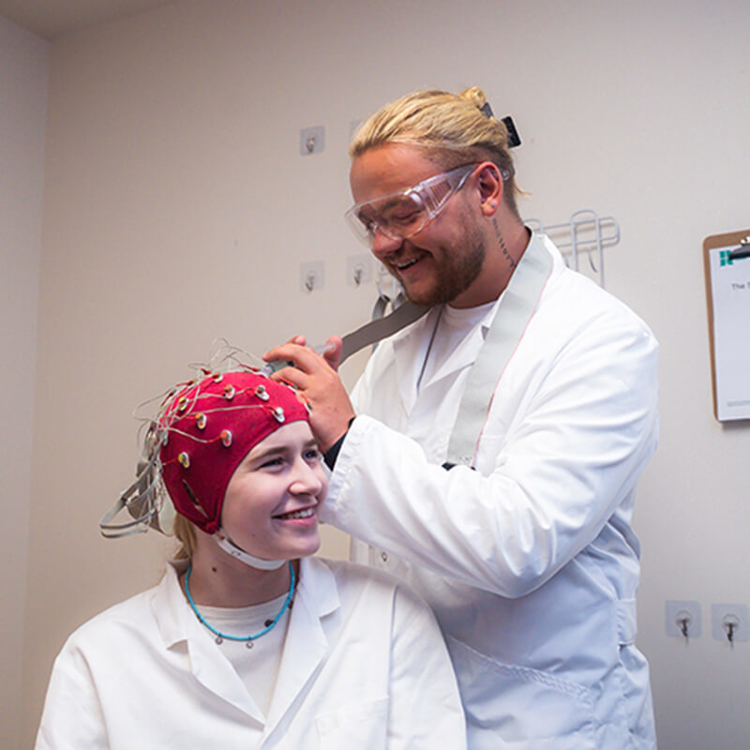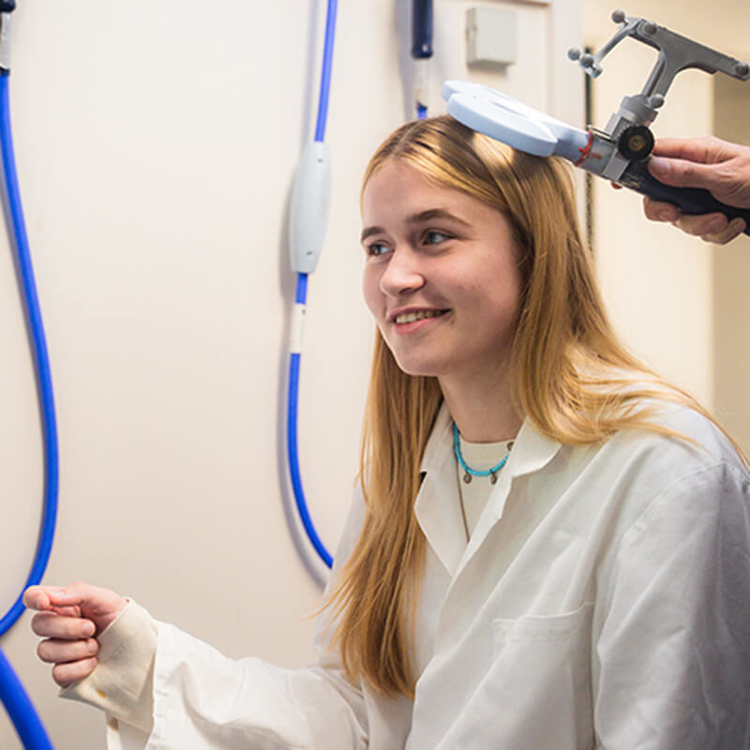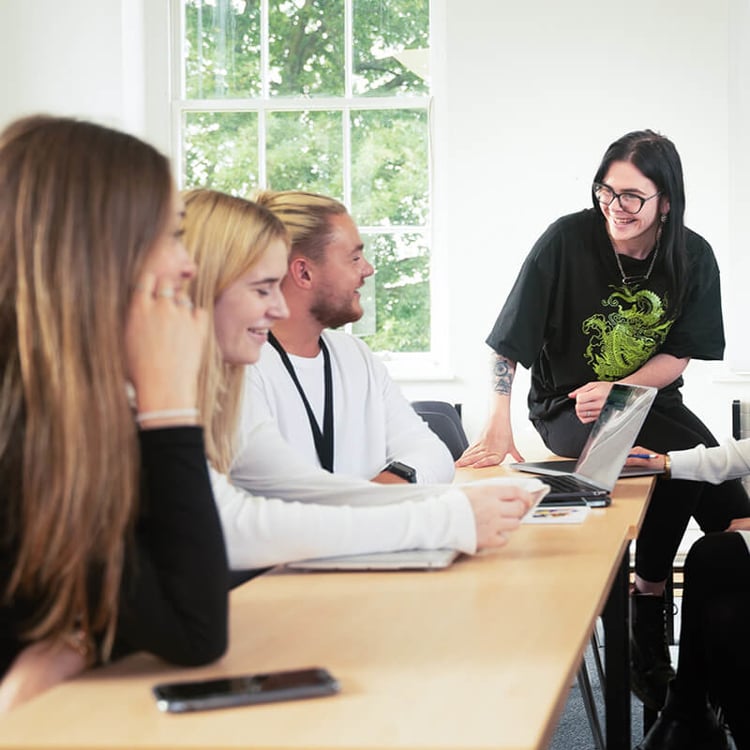/ Undergraduate /
Start date:
September 2025
You'll need:
112–128 UCAS points (or equivalent)
Foundation Year: 64–80 UCAS points (or equivalent)
UCAS Code:
B140
B141 (if choosing Foundation Year)

On-Campus Open Day
Saturday 12 July 2025
Welcome to BSc Neuroscience at Roehampton. This innovative and multidisciplinary programme draws upon recent advances in neuroimaging, cognitive neuroscience, psychology, and molecular and cell biology.
Did you know?
Study in state-of-the-art labs and learn to use specialised equiptment.
Top 3 modern university in London
(Complete University Guide 2025)

Ranked in the top 15% in the world
Times Higher Education Young University Rankings 2024

#8 in England for undergraduate student satisfaction
National Student Survey 2024

Foundation Year
This course can also be studied with a foundation year (September entry only).
Modules
Module details: This module will provide you with key knowledge on cell structure and function, alongside the chemistry principles underpinning biological processes. You will study the components of cells and the biochemistry of molecules such as nucleic acids, proteins, carbohydrates, and lipids. Additionally, you will learn about vital processes like DNA replication, protein production, metabolism, and the mechanisms controlling the cell cycle. Understanding these fundamental principles will be essential for your broader studies of the nervous system throughout your degree.
How you’ll learn: This module will be taught through a combination of lectures and seminars. Lectures will cover key principles and concepts, while seminars will include activities designed to deepen your understanding, such as applying knowledge to real-world scenarios. You will participate in practical laboratory classes during seminars, allowing you to develop essential laboratory skills. Seminar activities will also support your preparation for the module assessments, helping you apply what you've learned in both theoretical and practical contexts.
Assessment: You will be assessed through a poster and a portfolio, allowing you to showcase your knowledge of key topics in cell biology and biochemistry. These assessments will help you develop skills in synthesising and summarising information, as well as in written communication. The poster will also enhance your presentation and design skills. These transferable skills will be valuable throughout your degree, in postgraduate studies, and in various professional settings.
Modules Details: This module provides an opportunity to maximise your success within and beyond your degree. Through interactive lectures and seminars, you will explore topics that prepare you for university, postgraduate study, and the workplace. Sessions address procrastination, time management, and anxiety, helping you reach your full potential. You will develop research and reporting skills essential for psychology and related fields. The module also explores artificial intelligence (AI), emphasising its role alongside human intelligence. Additionally, you will identify and develop key skills, gaining insight into future career opportunities and professional growth, empowering you to excel in your chosen path.
How you’ll learn: You will be taught through a mixture of lectures and seminars. Lectures will cover key information and concepts to support your personal development. The seminars offer hands-on opportunities to apply lecture concepts in practice. You'll work independently and with peers to develop skills such as resource finding, debating, analysing, and presenting. You will also learn to use AI critically, ethically, and creatively—for example, for feedback, discussing complex ideas, and interview practice. This will help deepen your understanding while identifying AI’s limitations. Seminar activities will also support your assessments, enhancing your ability to engage with AI effectively and refine your academic skills.
Assessment: The assessments provide engaging ways to showcase your skills and understanding. You will be evaluated through a presentation, a critical debate, and a reflection. These tasks will enhance your ability to communicate clearly, present information effectively, and write persuasively. You will also develop skills in using AI for critical debate and reflection. These assessments will strengthen key abilities essential for your degree, postgraduate studies, and many workplaces, preparing you for future academic and professional success.
Module details: This module offers a comprehensive understanding of neuroscience, covering the nervous system's structures and functions, including key brain areas. You will learn how we sense the environment, control movement, and regulate bodily processes. The course also explores the communication between cells in the nervous system, the impact of various substances, and the development of the system. Additionally, you'll gain knowledge of techniques like MRI and EEG for investigating brain functions. This foundation will support your future studies and career in neuroscience.
How you’ll learn: This module will be taught through a combination of lectures and seminars. The lectures will provide essential core knowledge, while interactive seminars will deepen your understanding of the nervous system's structures and functions. In seminars, you will engage in practical activities, such as exploring the effects of damage to different systems and applying neuroscience to address these impacts. Additionally, seminar activities will support the module's assessments, helping you further develop and apply your knowledge.
Assessment: Your understanding of the nervous system in this module will be assessed through a presentation and a portfolio. These assessments will evaluate your grasp of the nervous system's structures, functions, and neuroscience techniques, which are crucial for your degree. They will help develop your written and oral communication skills, as well as your ability to synthesise, summarise, and apply knowledge—skills essential for the remainder of your degree, postgraduate studies, and various career paths.
Module details: This module introduces research approaches and data analysis methods used in psychology and related fields. You will learn to develop research questions and analyse data using both quantitative and qualitative methods. Quantitative analysis includes statistical techniques to describe data and explore relationships, while qualitative methods focus on identifying themes in text or interviews. This knowledge is essential for your degree, particularly for further data analysis and your final-year research project, as well as for postgraduate study and workplace applications.
How you'll learn: This module combines lectures and workshops to develop your understanding of research approaches and data analysis. Lectures will introduce key concepts and theories, while workshops provide hands-on experience in developing research questions, designing studies, and analysing data. You will also learn to use various software packages for data analysis. These interactive workshops will reinforce lecture content and support your assessments, ensuring you gain practical skills essential for conducting research throughout your degree and in future academic or professional settings.
Assessment: In this module, you will be assessed through a poster on a specific research question and a portfolio including tasks such as a literature review and research write-ups. These assessments will develop your research, data analysis, written communication, and presentation design skills, which are essential for your degree, postgraduate studies, and are highly valued by employers, enhancing your employability.
These modules are those we currently offer and may be subject to change.
Module details: In this module, you will explore how neuroscience can be applied to real-world situations and research. You will learn about neurological, psychological, and neurodevelopmental conditions, and how neuroscience aids in diagnosis, treatment, and interventions. The module covers everyday applications, such as improving cognitive and emotional regulation, as well as links to law, education, consumer behaviour, and drug development. You will gain hands-on experience in research design, data analysis, and cognitive neuroscience, helping you explore potential career paths in the field.
How you’ll learn: This module will be taught through a combination of lectures, seminars, and workshops. Lectures will provide background knowledge and the application of neuroscience research. Seminars will allow you to explore how neuroscience can improve lives and design your own studies, while also reflecting on your career development. Workshops will offer hands-on experience in designing and conducting research using cognitive neuroscience paradigms. Additionally, seminar and workshop activities will support your preparation for the module assessments.
Assessment: Your knowledge in this module will be assessed through a presentation and a research report. These assessments will evaluate your ability to synthesise, summarise, and critically assess relevant literature. The presentation will focus on applying your knowledge to a real-world issue, while the research report will develop your skills in study design, data analysis, and reporting findings in cognitive neuroscience. Both assessments will enhance your written and oral communication skills, preparing you for further studies and careers in neuroscience.
Module details: This module will deepen your understanding of molecular biology and genetics, covering DNA structure, replication, gene transcription, translation, and protein production. You will learn key laboratory techniques, including polymerase chain reaction, gel electrophoresis, DNA fingerprinting, and CRISPR for DNA modification. Practical laboratory sessions will allow you to apply these techniques. The module also explores genetics at the population and behavioural level, as well as advancements in molecular biology technology. It builds on your Year 1 biochemistry and cell biology knowledge, supporting future studies and careers in the field.
How you’ll learn: This module will be taught through a combination of lectures and seminars. Lectures will cover core concepts, theories, and research related to the topics, while seminars will provide opportunities to explore these topics further and apply your knowledge to real-world situations. Seminars will also include laboratory practicals, where you can apply your theoretical understanding of genetic analysis techniques. These practical’s, along with other seminar activities, will support your preparation for the module assessments.
Assessment: You will be assessed through a poster and a portfolio, which will allow you to demonstrate your understanding of key topics in molecular biology and genetics. These assessments will help develop your skills in synthesising, summarising, evaluating, and applying information, as well as enhancing your written communication and presentation design abilities. These skills will be essential for your remaining degree studies, postgraduate work, and will be highly valued by potential employers in various fields.
Module details: In this module, you will build on your earlier knowledge of neuroscience and biological processes. You will study various neurodegenerative conditions such as Alzheimer’s, Parkinson’s, and multiple sclerosis, exploring their causes, contributing factors, symptoms, and treatments. You will also learn about molecular mechanisms of cell death related to stroke and epilepsy. Additionally, the module covers the effects of drugs on the nervous system, including psychoactive drugs and pain control. The content will be valuable for your degree, postgraduate studies, and related careers.
How you’ll learn: This module will be taught through a combination of lectures and seminars. In lectures, you will learn about key concepts, theories, and research related to each topic. Seminars will provide opportunities to explore these topics further, including current and future research areas, and to apply your knowledge to real-world issues. The seminars will also include activities designed to support your preparation for the module assessments, helping you consolidate your learning and develop essential skills.
Assessment: In this module, you will be assessed through a leaflet and a stakeholder report. You will design a leaflet to inform a non-academic audience about a neurodegenerative condition and create a report discussing recent research and future directions for a topic covered in the module. These assessments will enhance your written communication skills for non-academic audiences and further develop your ability to synthesise, summarise, evaluate, and apply knowledge. These skills will be valuable throughout your degree, postgraduate studies, and in various careers.
Module details: In this module, you will explore the fundamental processes underlying human cognition and the relationship between physiological functions and mental processes. Key topics include learning, perception, attention, memory, and language, alongside the neurobiological basis of psychological experiences. Using current neuroscience research, you will develop an understanding of how biological factors influence cognition. Through theoretical study and empirical research, you will gain essential knowledge for further study, postgraduate education, and careers in psychology, neuroscience, and related fields, enhancing your academic and professional development.
How you'll learn: In this module, lectures and seminars will explore conceptual, historical, and contemporary ideas in cognitive and biological psychology. Lectures will cover key concepts and theories relating to topics in cognition and neuroscience. Seminars will include practical activities to apply theories from lectures and provide support for assessments, encouraging critical engagement with the material.
Assessment: In this module, you will be assessed through a presentation and a portfolio, enabling you to further develop skills in effective communication, critical handling of materials, and scientific reasoning to explore alternative approaches and solutions—key competencies for your future studies and employment.
These modules are those we currently offer and may be subject to change.
This course offers all students the option of a one-year paid work placement, to boost your employability even further. If you choose this route, you will take the placement following year two of your course, and then return to complete your degree.
Why take a placement?
A placement year is the perfect opportunity to gain valuable work experience, to build on the career skills we will teach you on this degree. The connections you make on the placement will improve your career prospects further, and equip you with the skills you need to secure graduate-level employment.
How we support you
The University's Placement and Work Experience Team are experts at helping you to secure a placement. They will work closely with you from the start, helping you research potential employers, discover placement opportunities, create and pitch your CV, and will coach you to perform well in interviews. We aren't able to guarantee a placement, but our sector-leading advisors will give you the best possible chance of securing one.
Find out more about how we'll support you
We understand that your plans might change once you start your programme. If you decide not to do a placement, you will have the option of completing the three year version of your programme.
Whatever your choice, you will have access to many opportunities for work experience through our Placement and Work Experience Team, and access to face-to-face and 24/7 online careers support.
Module details: Producing an independent project is a key part of your degree. In this module, you will develop research, project management, and communication skills through either an independent research or consultancy project. For a research project, you will independently design research questions, collect and analyse data, and report findings, interpreting them within the existing literature. For a consultancy project, you will critically evaluate contemporary research on a specific topic. The projects, spanning various neuroscience areas, will enhance skills valuable for postgraduate studies and future careers.
How you’ll learn: You will be supported in your project by a supervisor with expertise in the topic area, meeting regularly, typically in a small group. In addition, you will attend lectures and workshops to further develop your research skills and support your work. Lectures will guide you on approaching different aspects of your report, while also enhancing your knowledge of statistics and data analysis methods. Workshops will allow you to apply this knowledge to your own project, providing essential support for the module assessments.
Assessment: Whichever project you choose, you will be required to write a project report and deliver a poster presentation. These assessments will help you further develop both your written and oral communication skills. Throughout the module, your work on the project will also enhance your research and project management abilities. As a result, you will develop a range of key transferable skills that are crucial for postgraduate studies and valuable in many graduate careers.
Module details: This module will enhance your workplace professionalism and personal development, equipping you with key skills for your career. You will develop communication, reflective, and self-presentation skills while applying psychological literacy to ethical considerations, social responsibility, and self-regulation. Topics include leadership styles, emotional intelligence, and conflict management. You will complete a personal development portfolio, gain at least 30 hours of work experience, and earn certifications in areas such as diversity and leadership. This module will strengthen your CV and prepare you for future career opportunities, integrating theoretical concepts into real-world practice.
How you'll learn: This module will be delivered through a combination of lectures and workshops. In lectures, you will learn key career skills and explore potential career paths, while workshops will allow you to apply these concepts to your own personal development, reflecting on your strengths and areas for improvement. The workshops will also support your preparation for the assessment.
Assessment: You will be assessed through a portfolio, which will require you to complete the Chancellor's Career Award, at least 30 hours of work experience, and online training. Within the portfolio, you will reflect on your personal development and skills gained from the Chancellor's Career Award and work experience. You will also reflect on a potential career path after your degree and your next steps in personal and professional development. This assessment will enhance your reflective and written communication skills, which are highly valued in various careers and will support your career progression.
Module details: In this module, you will learn about the impact of brain damage on cognitive functioning, developing your understanding and critical analysis of key areas in neuropsychology across the lifespan. You will explore each major lobe of the brain and cover both sustained and progressive neuropsychological disorders. Each week will focus on a specific topic within the field. This module will enhance your knowledge of cognitive psychology and neuroscience, particularly useful if you are interested in a career working with neuropsychological patients or related research.
How you'll learn: You will be taught through a combination of lectures and seminars. The lectures will provide the foundational material for each topic, while seminars will involve activities such as critical discussions of key papers and case study videos on neuropsychological conditions. These in-depth discussions will help you explore theoretical, methodological, and statistical issues, deepening your understanding of current debates in the field. The seminars will also support your preparation for the module assessments, enhancing your overall learning experience.
Assessment: Your knowledge of neuropsychology will be assessed through a presentation and a stakeholder report. These assessments will help you build on the critical evaluation skills developed in previous years. The module will further enhance your oral and written communication, as well as your reflexive skills. These skills are highly valued for postgraduate studies and are essential for employment in a range of careers related to psychology and neuroscience.
Module details: In this module, you will explore changes in the brain and their links to mental health and wellbeing across various clinical conditions. You will learn about the effects of mental health conditions such as anxiety, mood disorders, and schizophrenia, as well as factors promoting brain health, like immune system function, sleep, and gut health. You will also study neurodevelopmental conditions like autism and ADHD, and neurological disorders such as stroke and Alzheimer’s disease. This module offers valuable insights for postgraduate studies and careers in clinical settings and research.
How you’ll learn: Throughout this module, you will be taught through a combination of lectures and seminars. The lectures will provide an overview of key research and current questions for each topic. Seminars will allow you to discuss these topics in depth, enhancing your understanding, and consider how further research can be developed to apply theoretical knowledge in improving people's lives. Seminar activities will also support your preparation for the module assessments, helping you apply what you've learned in a practical context.
Assessment: Your knowledge in this module will be assessed through a public communication and a stakeholder report. These assessments will help you synthesise, summarise, critically evaluate, and consider the impact of knowledge. They will also develop your ability to apply knowledge to real-world issues and enhance your communication skills for non-academic audiences. These assessments will provide you with a range of valuable skills, which are crucial for postgraduate studies and highly sought after in many professional settings.
These modules are those we currently offer and may be subject to change.
This course offers a foundation year, which takes place at the beginning of your studies. Studying a foundation year will give you academic and practical experience, and a strong introduction to your subject, ensuring you succeed on your undergraduate degree.
30 credits
You will develop your core academic and integrated English language skills of speaking, listening, reading and writing. You will become familiar with key academic skills and concepts, such as referencing methods and awareness of academic integrity and tone. You will apply these skills and knowledge to both broad topics and also your chosen subject pathway.
Teaching and learning
You will be required to actively engage in on-campus learning for up to 10 hours a week.
You will be taught through a full range of teaching and learning methods, which include lectures, seminars, workshops, discussion groups, group directed tasks and presentations. This will enable you to learn from your peers and tutors in both structured and information settings.
You will be encouraged to think creatively about your approach to learning and discussions with your peers. You will also have access to recordings, resources, links and signposting through Moodle to enrich your learning.
Assessment
You will be assessed through group and individual presentations, comparative and reflective essays, multiple choice exams, coursework and reports, oral exams, portfolios, case studies and blogs.
30 credits
You will develop your research, numeracy and information technology skills. You will investigate the difference between primary and secondary research, conduct your own research project and demonstrate your findings through data analysis. You will also develop your awareness of equality, diversion and inclusion in the UK, through a real-world issue; discrimination in the workplace.
Teaching and learning
You will be required to actively engage in on-campus learning for up to 10 hours a week.
You will be taught through a full range of teaching and learning methods, which include lectures, seminars, workshops, discussion groups, group directed tasks and presentations. This will enable you to learn from your peers and tutors in both structured and information settings.
You will be encouraged to think creatively about your approach to learning and discussions with your peers. You will also have access to recordings, resources, links and signposting through Moodle to enrich your learning.
Assessment
You will be assessed through group and individual presentations, comparative and reflective essays, multiple choice exams, coursework and reports, oral exams, portfolios, case studies and blogs.
30 credits
This module focuses on an in-depth exploration of applied psychology, drawing on foundational theories and models that explain human behaviour. You will engage with the issues and debates around some of the core psychological concepts, such as prejudice, stereotyping, group dynamics, and conformity, gaining a broad understanding of what influences human behaviours.
The module introduces the bio-psycho-social model within health psychology, providing a holistic framework for understanding health-related behaviours. You will gain a knowledge of how different psychological theories and models can be applied to understand the development of risky health behaviours and can be applied to design effective health intervention strategies.
You will learn the skill of collaborative group work, which is an integral part of the module, encouraging you to apply your knowledge of psychological theories to analyse and present a case study on risky health behaviour. You will also develop the skill of critical analysis, integrating various theories and models in psychology to explain risky health behaviour and suggest intervention programs.
Teaching and learning
The teaching delivery for each module consists of one, one-three-hour lecture and one, two-hour seminar per week. You will learn through a blend of lectures and interactive sessions, case studies and group presentations.
There will be an additional 30 minutes of online support per week. This will consist of individual tasks such as quizzes, posting on discussion forums, watching videos and taking notes, and reading articles or chapters.
Assessment
This module will be assessed using a written assessment and a group presentation.
50% - written assessment, composed of two parts; essay and self-reflection. You will write an essay on your knowledge of at least two psychological theories or models to explain why people develop risky health behaviours and propose and evaluate intervention strategies. You will reflect on your experience and learning journey as you prepared for and wrote the essay.
50% - group presentation, where you will apply knowledge from psychology theories to plan health interventions on risky health behaviour.
30 credits
This module focuses on the different perspectives available in psychology to explain human behaviour.
You will get the opportunity to explore methods of scientific thinking and reasoning within a Psychology context in an enquiry-based way. Problem-based learning and blended learning (combines online and face-to-face time) approaches will facilitate deep, experiential learning.
You will gain knowledge on what scientific thinking is, how to distinguish this from pseudoscience and how the scientific cycle enquiry can be applied to the various perspectives in psychology.
You will be encouraged to explore how different perspective in psychology can explain human behaviour, scientific argumentation and ethical working practices in relation to current scientific topics as reflected in news reports, recent academic publications and historical case studies. You’ll gain the skill of critical thinking and how to apply concepts from psychology to explain everyday behaviour, as well as poster presentation and public speaking.
Teaching and learning
The teaching delivery for each module consists of one, one-three-hour lecture and one, two-hour seminar per week. Lectures will introduce the scientific basis of knowledge and research methodologies in the context of Psychology and empower you to distinguish between science and pseudoscience, while seminars will consist of individual and group activities on the weekly topics.
There will be an additional 30 minutes of online support per week. This will consist of individual tasks such as quizzes, posting on discussion forums, watching videos and taking notes, and reading articles or chapters.
Assessment
This module will be assessed using a group poster presentation and written assessment.
40% - group poster presentation, you will compare and contrast any two perspectives on psychology.
60% - written assessment, you will write a critical essay on how pseudoscience differs from science.
These modules are those we currently offer and may be subject to change.

Skills
Understand how the brain and nervous system work and their impact on cognition and behaviour and relationships with health and diseases.
Our priority is ensuring you graduate with an expert, professional skillset. This includes:
- Contemporary laboratory skills and the confidence to conduct research and experiments in neuroscience.
- Industry experience through our work experience module, so you can apply your knowledge and professional skills to your chosen workplace.
- High level skills in decision making, problem solving, group work, critical thinking, self-confidence, presentations, written communication and analysis.
By choosing Roehampton, you’ll develop the insights, practical skills, and impactful knowledge for a rewarding career.
Led and taught by experts at the forefront of their disciplines, you'll gain a broad understanding of the fascinating area of Neuroscience. You will:
- specialise in health, illnesses and disorders of the nervous system
- understand the relationship between the brain, its related cognitive functions and human behaviour
- learn from academics conducting cutting-edge research
- apply contemporary techniques, including electroencephalography, non-invasive brain stimulation and neuroimaging, in our state-of-the-art facilities.
Learning
Your learning is tailored to the specific demands of the field of neuroscience.
This includes:
- Lectures: develop a critical understanding of theory and empirical research.
- Seminars and workshops: put your learning into practice with your tutors and fellow students.
- Laboratory practicals: learn and apply advanced laboratory skills.
Through discussions, debates and group projects, and you will explore neuroscience in the real world, as well as the latest advancements in the field.
Check out the state-of-the-art psychological and biomedical laboratories where you will be studying.

Dr Carla Startin
I am the Programme Leader for the BSc Neuroscience degree. My background is in cognitive neuroscience, and I joined Roehampton in July 2020. I am involved in teaching across different aspects of our BSc Neuroscience degree. My current and previous research relates to differences between people in their cognitive abilities and related brain activity, and neurodevelopmental conditions relating to these - firstly differences in terms of how we process information during social interactions, and secondly differences between people with Down syndrome and the development of dementia in this population.

Dr Paul Dickerson
I’m Paul Dickerson, I’m a Principal Teaching Fellow and I started at Roehampton way back in 1991! Even though I have been at the University for nearly 30 years each year still feels fresh. I teach across multiple modules and programmes with a particular interest in qualitative research and social psychology and I want to enthuse everyone about this amazing subject. I love sharing my passion for psychology in all of my teaching and writing and – but don’t tell anyone – I do sometimes share a song I have written for the students that I teach. I have a particular interest in helping you to reach your full potential and I run weekly lunchtime sessions to help with this – use this link https://study.sagepub.com/psychologybrilliantessays to find out about the sorts of things covered. I hope that I will have the opportunity to help you enjoy this wonderful subject as much as I have.

Dr Marco Sandrini
Hi, I am Marco! I have been at Roehampton since 2015. I graduated in Experimental Psychology at the University of Padua (Italy). I then obtained a PhD in Neuroscience at the University of Verona (Italy) and undertook a two-year post-doctoral fellowship at the Centre for Mind/Brain Sciences (University of Trento, Italy) and spent five-years as a research fellow at the National Institutes of Health (USA), the largest biomedical research agency in the world.
The focus of my research is interventions to enhance memory in aging and reduce the frequency of intrusive memories of trauma using the combination of neuroimaging and non-invasive brain stimulation.
I am primarily involved in the teaching of research methods and statistics and cognitive neuroscience. I am the module convenor for the second year undergraduate module “Psychological Research: Design, Analysis and Impact” and “Use of Cognitive Neuroscience Techniques” for the master in Applied Cognitive Neuroscience

Dr Giorgio Fuggetta
I obtained my BSc and MSc in Psychology from University of Padua, Italy (2000), and received my Ph.D. in Neuroscience from the University of Verona, Italy (2006).
I was a postdoctoral research fellow at the Institute of Cognitive Neuroscience (ICN), University College London (2006-2007), and then a Lecturer in Psychology at the University of Leicester (2007-2016), before being appointed to the University of Roehampton London in 2016 as a Senior Lecturer in Psychology.
My current research explores the neural mechanisms underlying attentional control processes using electroencephalography (EEG) and Transcranial Magnetic stimulation (TMS) techniques. I am also conducting translational research in cognitive and educational psychology, studying the association between individual differences in executive function (EF) skills and academic achievement in adolescence. I teach techniques in cognitive neuroscience to MSc Applied Cognitive Neuroscience students and research methods, statistics and neuropsychology to BSc Psychology students.

Assessment
You’ll learn to integrate theory with practice, so you can develop and demonstrate your academic and professional skills.
You’ll be set real-world assessments, such as portfolios, case studies, presentations and research studies, to replicate the working world of neuroscience and prepare you for your career.
In your third year you’ll also complete an independent research project, allowing you to specialise and explore an area of neuroscience you are passionate about.
Career
You’ll be prepared to go into a range of careers and industries.
This includes:
- Scientific research and teaching in neuroscience, biological sciences and psychology.
- Clinical and healthcare sector.
- Pharmaceutical industry, including drug development, biotechnology and bioinformatics.
- Data science.
- Health science and health services research.
- Science communication, including museum work, public engagement and scientific publishing.
Your potential roles could be:
- Clinical Research Assistant
- Biotechologist
- Pharmaceutical researcher

Open days
Get a real taste of our campus, community and what it’s like to study at Roehampton
Applying
Full-time UK undergraduate students apply through UCAS.
Course subject to curriculum review and validation.
Entry tariff
112–128 UCAS points (or equivalent)
Looking to work out your UCAS points or find out about our entry requirements? Find out more.
When we consider applications to study with us, we form a complete view of your achievements to date, and future potential, and can offer flexibility in entry requirements. Find out more about our Contextual Offer scheme.
Specific entry requirements
A level/BTEC (or equivalent qualification) required in Biology or Chemistry.
GCSE (or equivalent) requirement: Maths, Grade C/4.
General entry requirements
September 2025 entry tuition fees
UK (home) tuition fees
Undergraduate degree: £9,535
We offer a wide range of scholarships and bursaries. See our financial support pages for UK students.
We also provide other ways to support the cost of living, including free buses and on-campus car parking, hardship support and some of the most affordable student accommodation and catering in London. Find out more about how we can support you.
Additional costs to consider
Travelling to and from work experience may require some additional expenses.
It is possible you could have to pay for an enhanced DBS check depending on the work experience / if your dissertation requires this, however, this would be rare.
Any field trips may involve expenses.
International undergraduate students apply through our direct application system.
Course subject to curriculum review and validation.
Entry tariff
112–128 UCAS points (or equivalent)
Looking to work out your UCAS points or find out about our entry requirements? Find out more.
When we consider applications to study with us, we form a complete view of your achievements to date, and future potential, and can offer flexibility in entry requirements. Find out more about our Contextual Offer scheme.
Specific entry requirements
A level/BTEC (or equivalent qualification) required in Biology or Chemistry.
GCSE (or equivalent) requirement: Maths, Grade C/4.
General entry requirements
September 2025 entry tuition fees
EU and international tuition fees
Undergraduate degree: £16,950
Foundation Year: £16,950
International Foundation Pathway: £16,950
We offer a wide range of scholarships and bursaries. See our financial support pages for international students.
We also provide other ways to support the cost of living, including free buses and on-campus car parking, hardship support and some of the most affordable student accommodation and catering in London. Find out more about how we can support you.
Additional costs to consider
Travelling to and from work experience may require some additional expenses.
It is possible you could have to pay for an enhanced DBS check depending on the work experience / if your dissertation requires this, however, this would be rare.
Any field trips may involve expenses.






